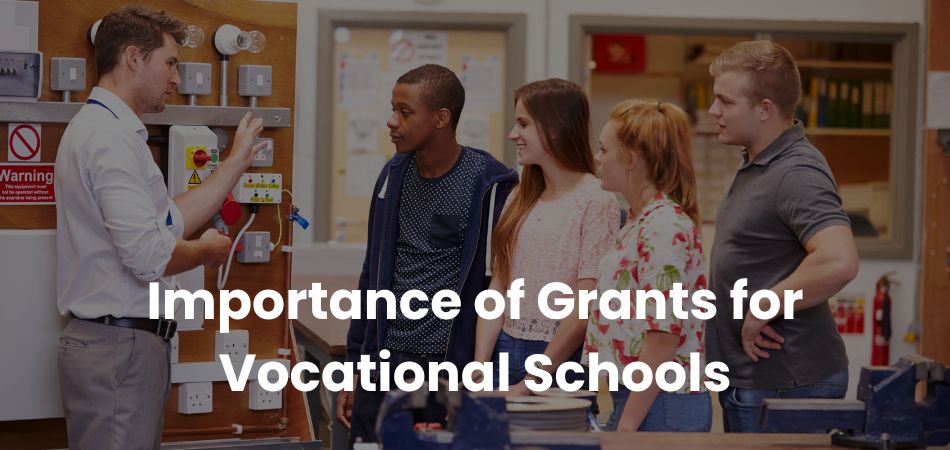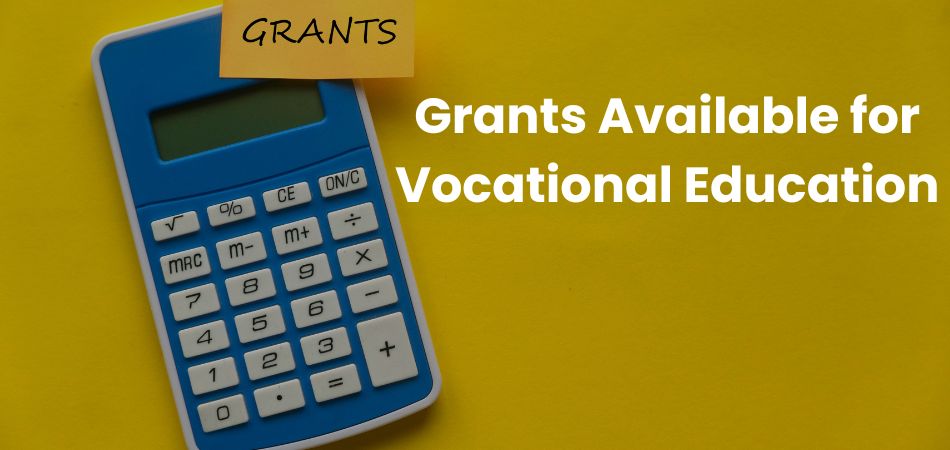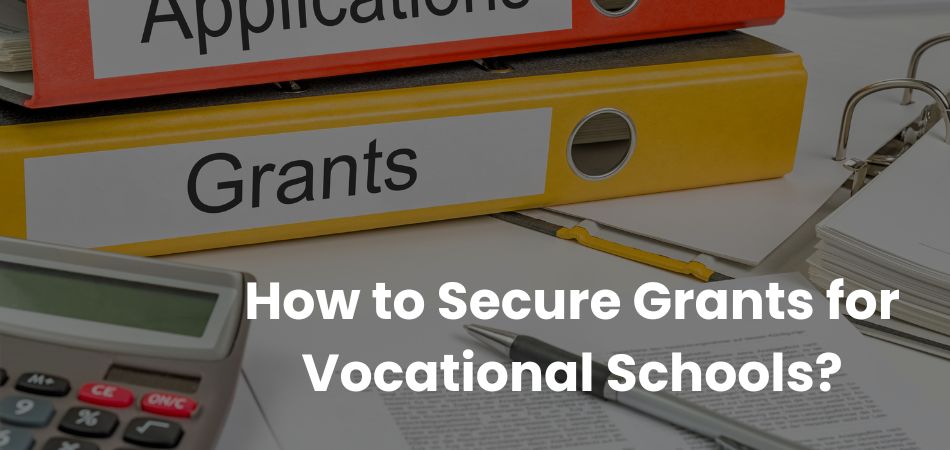Securing grants is an important step for vocational schools to provide quality education and training without financial barriers. Grants not only support the development of infrastructure but also help in offering scholarships, purchasing equipment, and expanding programs.
With the rising demand for skilled labor, funding opportunities for vocational education are increasing, but knowing how to secure grants for vocational schools is essential.
Securing grants for vocational schools requires careful planning and execution. From identifying opportunities to preparing compelling proposals, you need to make sure you go through all the steps properly.
This guide will walk you through the steps to identify funding sources, craft compelling applications, and maximize your chances of success.
Importance of Grants for Vocational Schools
Vocational schools need adequate funding to prepare students for the workforce with practical skills. These institutions often rely on external funding to provide modern facilities, up-to-date equipment, and high-quality training programs. Without adequate financial resources, vocational schools may struggle to maintain industry standards.

In addition to contributing to education quality, grants enable vocational schools to make their programs accessible to a wider range of students. Many learners, especially those from underserved communities, benefit from scholarships and reduced tuition costs made possible through grant funding. This not only promotes inclusivity but also helps fill a skills gap in various industries.
Grants also promote innovation by allowing vocational schools to pilot new programs and adopt emerging technologies. This ensures that students are trained in innovative methods, making them competitive in a rapidly evolving job market.
Types of Grants Available for Vocational Education
Vocational education provides students with job-ready skills, but funding is often needed to sustain and expand these programs. Various types of grants are available to support vocational schools, each designed to specific needs and objectives.

Federal Grants
Federal grants, such as those offered through the Perkins Career and Technical Education Act, are a significant source of funding for vocational schools. These grants focus on improving the quality of technical education and making it accessible to underserved communities. Schools can use the funds to purchase equipment, develop programs, and provide student support services.
State-Sponsored Grants
Many states provide grants specifically designed to support vocational and technical training programs. These grants align with local industry demands, ensuring that students are prepared for the regional job market. Funding from state grants can be used for curriculum development, teacher training, and career counseling.
Private Foundation Grants
Private foundations, such as those established by corporations or philanthropists, often fund vocational education initiatives. These grants typically target specific industries, such as healthcare, technology, or manufacturing. Schools can use this funding to build partnerships with businesses and offer specialized training programs.
Scholarship Grants
Scholarship grants are designed to help students afford vocational education by covering tuition and related expenses. These grants are often provided by private organizations, state programs, or school foundations. They enable students from low-income families to access training that can lead to high-paying careers.
Program-Specific Grants
Some grants are designated for specific programs, such as green technology, healthcare, or advanced manufacturing. These targeted grants allow schools to develop niche programs that address industry shortages. They also encourage innovation by funding the implementation of cutting-edge tools and techniques.
Who Can Apply for Vocational School Grants?
Vocational school grants are available to a variety of individuals and organizations involved in technical education. Maximizing the reach and impact of these funding opportunities requires knowing who can apply.
- Vocational School Administrators: Administrators can apply for grants to enhance facilities, curriculum, and program offerings.
- Teachers and Educators: Instructors may seek grants for professional development or to implement new teaching methods.
- Nonprofit Organizations: Nonprofits focused on education and workforce development can secure grants for vocational training initiatives.
- Community Colleges: These institutions often qualify for grants to expand their technical education programs.
- Industry Partnerships: Companies partnering with schools can apply for grants to fund apprenticeship and training programs.
- Students and Parents: Individuals may apply for scholarship grants to help cover tuition and educational costs.
- Minority and Underserved Groups: Grants are often available specifically to support programs for underrepresented communities.
- Start-up Vocational Schools: New schools can apply for initial funding to establish their programs and infrastructure.
- Government Entities: Local governments can apply for grants to support regional workforce development initiatives.
- Research and Development Teams: Teams developing innovative vocational training methods can access grants to fund their projects.
How to Secure Grants for Vocational Schools? [Tips and Best Practices]
Grants for vocational schools require a well-planned approach and a clear overview of the application process. By following key tips and best practices, vocational schools can increase their chances of obtaining funding to support their programs and initiatives.

1. Identify the Right Grant Opportunities
Research thoroughly to find grants that align with your school’s mission and goals. Explore federal, state, private, and nonprofit funding sources to discover all available options. Pay attention to eligibility requirements and application deadlines to ensure you’re targeting the right opportunities. Keeping a database of potential grants can streamline your search process.
2. Get to know the Grant Requirements
Carefully review the guidelines and criteria for each grant to avoid disqualification. Note specific requirements such as matching funds, reporting obligations, or focus areas. Ensure that your proposal aligns with the grant provider’s objectives and priorities. Following instructions precisely demonstrates professionalism and increases your credibility.
3. Develop a Strong Grant Proposal
A compelling grant proposal clearly outlines your goals, needs, and how the funds will be used. Include detailed plans, budgets, and measurable outcomes to showcase accountability. Use data and success stories to illustrate the impact your programs can have on students and the community. Highlight how the grant aligns with the grantor’s mission and priorities.
4. Build Collaborative Partnerships
Form partnerships with local businesses, nonprofits, or government agencies to strengthen your application. Collaboration demonstrates a broader impact and often meets grant requirements for community engagement. Partners can also provide additional resources, expertise, or matching funds to strengthen your proposal. Strong partnerships make your project more appealing to funders.
5. Utilize Technology for Grant Applications
Use grant management software or online platforms to simplify the application process. These tools can help you track deadlines, organize documents, and monitor your progress. Many grant platforms also provide templates or guidance to improve your proposals. Utilizing technology saves time and ensures that no important detail is overlooked.
6. Follow Up and Maintain Communication
After submitting your application, follow up with the grant provider to confirm receipt and inquire about timelines. Demonstrate professionalism by promptly addressing any questions or requests for additional information. Keep an open line of communication to build relationships with grant administrators. Even if you don’t succeed, feedback from the provider can help improve future applications.
7. Track and Report on Grant Outcomes
Once awarded, maintain detailed records of how the funds are used and the outcomes achieved. Meet all reporting requirements to demonstrate accountability and build trust with the grant provider. Share success stories and measurable impacts to showcase the effectiveness of your program. A strong track record increases the likelihood of receiving future funding.
When is the Best Time to Apply for Grants?
The best time to apply for grants depends on the type of grant, the funding cycle, and your preparedness. Most organizations have specific deadlines, so start your application process early to avoid last-minute stress. Researching grant opportunities and aligning them with your goals is crucial for success.
Spring and fall are typically the busiest grant application seasons, as many organizations release their funding opportunities during these periods. Be sure to review the grantmaker’s timeline, as some opportunities may have rolling deadlines, allowing you to apply at any time. Staying informed about grant cycles ensures you don’t miss key opportunities.
Preparation is key. Before applying, gather required documents, craft a compelling proposal, and ensure your project aligns with the funder’s priorities. Starting early gives you time to refine your application, address potential challenges, and submit a strong proposal by the deadline.
How to Align Your Vocational Program with Grant Requirements?
Timing is crucial when applying for grants to maximize your chances of success. Most grant opportunities have specific application windows, often tied to annual budgets or funding cycles. Being aware of these timelines allows vocational schools to prepare and submit strong proposals well before the deadlines.

The best time to apply for grants is typically during the early stages of the application period. Early submissions ensure that your proposal receives thorough consideration before funders experience a surge in applications. It also provides a buffer to address any unexpected issues, such as missing documents or technical problems with online submissions.
Planning ahead is essential, as many grant programs require detailed information and supporting materials. Prepare months in advance to ensure all requirements are met. By aligning your application timeline with grant deadlines, you increase your chances of funding.
Common Mistakes to Avoid When Applying for Grants
Applying for grants can be a competitive process, and even minor mistakes can result in missed opportunities. Being aware of common pitfalls helps ensure your application stands out and meets the grant provider’s expectations.
- Failing to Follow Guidelines: Ignoring specific instructions or submitting incomplete applications is one of the most common reasons for rejection. Always review the requirements thoroughly and ensure your proposal aligns with the funder’s priorities.
- Missing Deadlines: Submitting an application late or rushing to meet the deadline can compromise its quality. Plan your timeline carefully and aim to submit well before the cut-off date to avoid last-minute issues.
- Providing Vague or Unsupported Information: Applications lacking detailed plans, budgets, or measurable outcomes fail to convey credibility. Use clear, data-driven arguments and provide evidence to support your claims.
- Neglecting to Customize the Proposal: Using a generic proposal for multiple grants can make your application seem impersonal. Make sure each proposal addresses the unique goals and requirements of the grant provider.
- Overlooking Post-Submission Follow-Up: Failing to follow up with the funder after submitting the application can hinder your chances. Proactively confirm receipt and address any additional questions to maintain a positive impression.
Frequently Asked Questions (FAQs)
A grant application for vocational schools can be a challenging process, and many applicants have similar concerns. Here are some of the most common FAQs, along with clear answers to guide you in your journey.
1. What Types of Grants Are Available for Vocational Schools?
Vocational schools can apply for federal, state, private foundation, and program-specific grants. These grants often fund initiatives like upgrading facilities, purchasing equipment, or providing student scholarships. Each type of grant has unique requirements and focuses, so research thoroughly.
2. How Do I Find the Right Grants for My Vocational School?
Research government programs, nonprofit organizations, and private foundations that support education and workforce development. Online databases, grant directories, and local education agencies are excellent resources. Networking with other vocational schools and attending grant workshops can also uncover new opportunities.
3. What is the Most Important Part of a Grant Application?
A strong grant proposal is the most crucial component of an application. It should clearly outline your goals, explain how the funds will be used, and demonstrate the impact of your program. Including measurable outcomes and aligning your proposal with the funder’s priorities increases your chances of success.
4. How Long Does It Take to Get a Grant Approved?
The approval process varies depending on the grant provider and the complexity of the application. Federal and state grants often take several months, while private grants may have shorter timelines. Always account for the review period when planning your project to ensure funding aligns with your needs.
5. Can We Apply for Multiple Grants at the Same Time?
Yes, applying for multiple grants simultaneously is a good strategy to increase your funding chances. Ensure each application is relevant to the specific grant and meets all requirements. If awarded multiple grants, track and manage the funds carefully to comply with reporting obligations.
Final Words
To provide quality education and meet the demands of a skilled workforce, vocational schools need funding. By researching opportunities, knowing requirements, and crafting strong proposals, schools can successfully obtain the financial support they need.
So, how to secure grants for vocational schools? It’s about planning, persistence, and showcasing the positive impact of vocational training. With the right approach, your school can access resources to empower students and drive meaningful change.
